Consider giving your dog these healthy foods next time. Watch out for these toxic foods as well!
A lot of people feel that dogs should not be given any “people” food, however, if you’d like to reward your pet with table scraps, you actually can safely, just make sure that you choose people foods that aren't harmful for canines.
Here are a few “dog-approved” people foods that are actually are perfectly safe… and even healthy!
Coconut & Coconut Oil
Coconut is made up of a beneficial fatty acid chain called Lauric acid, and when dogs and humans synthesize Lauric acid it produces a compound called monoglyceride monolaurin. Additionally, coconut contains albumin, which is a water-soluble protein found in many animal tissues and liquids.Peanut Butter (Conflicting Information PLEASE READ CAREFULLY)
This is a favorite treat of many canines, and has been for years. It is recommended by many professionals as a safe snack, and is added to hundreds of dog treat products.Lean Meat
Think chicken, beef, or pork with no visible fat and no added sauces or seasonings can be a great training treat or can add a bit of good-quality extra protein to your dog’s diet.Liver
Used in moderation, this meat is also a good choice and available freeze-dried in most pet stores It makes a great training treat, that you can also buy fresh in the grocery store to feed at home.Salmon & Tuna
These are good sources of omega 3 fatty acids, which are responsible for keeping your dog’s coat healthy and shiny, as well as supporting your dog’s immune system. Feed your dog cooked salmon, add salmon oil to food, or slip them some of your unwanted fish skins.Eggs
Scrambling up an egg for your pup is a great way to give their diet a protein boost.Cheese & Cottage Cheese
A great treat for a dog as long as they are not lactose intolerant, which a small percentage are. Opt for low or reduced fat varieties and don’t overfeed, as many cheeses can be high in fat.Greek Yogurt & Kefir
High in calcium and protein, but make sure to only choose yogurts that do not contain artificial sweeteners or added sugars.Pasta
Dogs can eat pasta, which is really nothing more than flour, water, and sometimes eggs. All of these ingredients are safe for dogs, so any variety of pasta should be fine but I lean toward whole grain pasta.Rice/Brown Rice
This is good to use when your dog has an upset tummy and needs a bland meal.Sweet Potatoes
are another source of dietary fiber and contain vitamin B6, vitamin C, beta carotene, and manganese.Popcorn
This is best when it is air popped with no butter or salt. It makes a great low calorie treat, contains potassium as well as the bone-building minerals phosphorous, magnesium, and calcium.Flax Seed (milled or oil)
This is a good source of omega-3 fatty acids that are good for skin and coat. Whole flax seeds are best if ground right before feeding as this type of fat can go rancid quickly.Baby Carrots
These are great for a dog’s teeth, they are low calories and high in fiber and beta carotene/vitamin A.Pumpkin, Squash & Zucchini
It can help keep the GI tract moving and can aid with digestive issues.Green Beans
Make a great treat for your dog since they are filling and low in calories.Peas
Peas are a good source of the B vitamin Thiamin, phosphorous, and potassium.Broccoli
This vitamin-rich vegetable can be a great occasional nutrition boost for dogs.Seaweed Nori
Dried edible seaweed (red algae species), is a Japanese staple often associated with sushi. It has protein, soluble fiber, Vitamins C, E and all the B vitamins, and minerals such as zinc and copper.Fruit Salad
Strawberries, blueberries, apples, cantaloupe, watermelon and bananas are all great choices.Apple Slices
Help to clean residue off a dog’s teeth, which helps to freshen her breath.Cranberries
Fresh cranberries have many health benefits and provide vitamins A, B1, B2 and C, and prevent urinary tract infections.Pears
Dogs can eat pears safely, but the cores — specifically the seeds — can be toxic to canines.Pineapple
The fruit is rich in fructose, fiber, vitamin and mineral content. Your dog can eat pineapple to boost its immune system and improve digestion.Parsley
This herb has long been thought to improve “doggie breath”, so next time you are baking treats for your dog, try adding a few tablespoons of chopped parsley for added flavor and color.Mint
Peppermint is strong but safe for dogs. Try using it as an ingredient if you bake your own homemade dog biscuits. It helps freshen your pal’s bad breath, and since peppermint has long been used to help settle upset tummies, you can even use it to help the next time your dog is a bit “barfy.”Cinnamon
A sprinkle of cinnamon every now and then is just as good for your dog as it is for you. Cinnamon has been long used to cure nausea and gas, and has been used to boost energy, circulation, digestion and brain health. Don't overdo it, though! Too much cinnamon can have an anti-clotting effect.Turmeric
This is one of the most promising cancer prevention foods and can be found in your spice rack. The active compound in turmeric is curcumin, which has been shown to prevent the growth or spread of cancer cells in many types of cancer. It does this by acting as an anti-inflammatory and antioxidant, and by encouraging cancer cell death.Spirulina
This is a type of algae that is high in protein, vitamins, minerals, and essential fatty acids, it makes an ideal addition to a healthy diet. However, spirulina also has some added health benefits above and beyond basic nutrition. In many experiments based both on animals and humans, it was found that spirulina supported heart health by lowering the amount of fat in the blood, as well as lowering inflammation.Carob
Almost every dog owner knows that chocolate is poisonous to their pets, but there’s no reason why your pooch can’t enjoy carob. Not only does carob not contain caffeine or the theobromine that makes chocolate so deadly for dogs, but it actually has many healthy properties.Foods That Are Toxic
Never feed your dog toxic human items such as: chocolate, onions, grapes, raisins, yeast dough, artificial sweeteners, macadamia nuts, avocadoes, alcohol, or coffee. Consult your veterinarian with any questions on what is safe and what is harmful.Chocolate
You've likely heard that you're never supposed to feed a dog chocolate, and there's a reason for that. That delicious candy contains caffeine-like stimulants known as methylxanthines. While amounts vary by type of chocolate, it's the theobromine that is poisonous to dogs. If ingested in large amounts, chocolate can cause vomiting, diarrhea, irregular heartbeat, seizures and even death.Grapes & Raisins
While this fruit is nutritious for you, it's toxic to dogs and can cause kidney failure. The type of grape or raisin doesn't seem to matter, and the amount consumed may be a single serving of raisins or a pound or more of grapes. (Raisins are much more concentrated.) Researchers are exploring the possibilities: a mycotoxin (fungal toxin), pesticide, herbicide or heavy metals, but thus far the actual toxin is unknown at this time.Onions & Garlic
Garlic and onions of all forms — powdered, raw, cooked, or dehydrated — can destroy a dog's red blood cells, leading to anemia. That can happen even with the onion powder found in some baby food.Avocado
Avocado leaves, fruit, seeds and bark contain a toxin called persin that can cause upset stomach and breathing difficulties.Alcohol
Even drinking a small amount of alcohol can result in significant intoxication for a dog, which can lead to vomiting, seizures and even death.Coffee, Tea, & Other Caffeine
Caffeine in large enough quantities can be fatal for a dog, and it is said there is no antidote. Symptoms of caffeine poisoning include restlessness, rapid breathing, heart palpitations, muscle tremors, fits, and bleeding.Macadamia Nuts
Dogs should not eat macadamia nuts or foods containing macadamia nuts because they can be fatal. As few as six raw or roasted macadamia nuts can make a dog ill. Symptoms of poisoning include muscle tremors, weakness or paralysis of the hindquarters, vomiting, elevated body temperature, and rapid heart rate.Candy & Gum
Candy, gum, toothpaste, baked goods, and some diet foods are sweetened with xylitol. Xylitol can cause an increase in the insulin circulating through your dog's body. That can cause your dog's blood sugar to drop and can also cause liver failure that can occur within just a few days.Salt
Eating too much salt can cause excessive thirst and urination and lead to sodium ion poisoning.
Now that you know what the best foods to give you dog are, consider making Fido's meals more colorful and interesting. He will definitely appreciate a larger variety of dog food that he can enjoy every day!
For more information on healthy foods for your pooch, visit The Science of Eating.
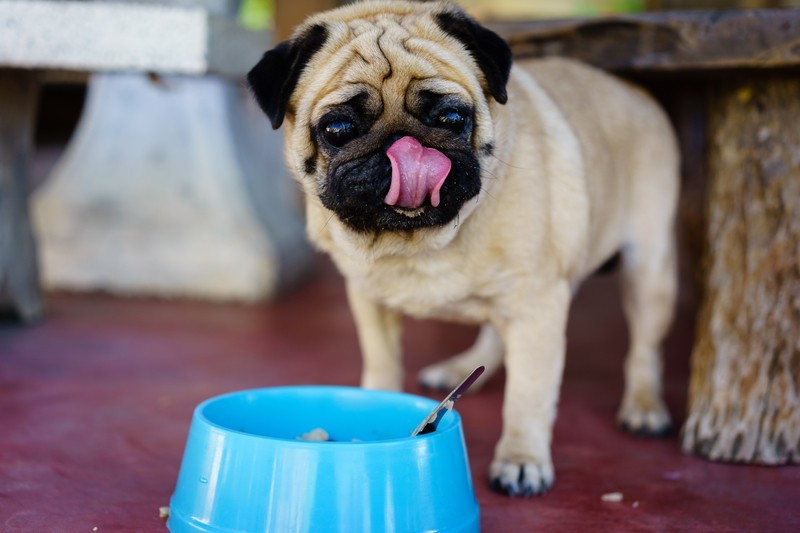
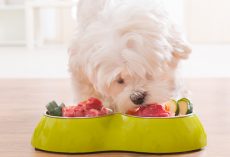
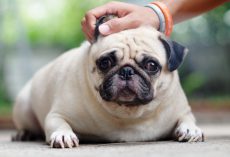



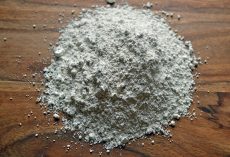
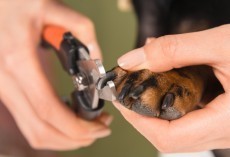


Impressmypets.com
- Edit
Nice ! thanks a lot I really love Dogs
Dwight Unger
- Edit
Can I have some more?
Joey Mascareñas
- Edit
Glorianna Nansel-Mascareñas
Brittney Everett
- Edit
Christi Bowers
Marybeth Swoope
- Edit
Pike and I are sharing an apple right now.